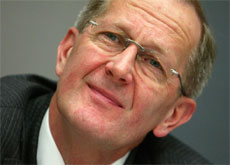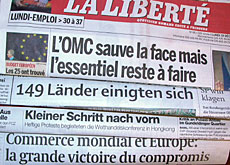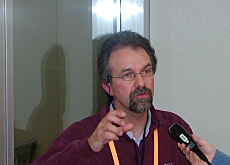Deiss says Switzerland can live with WTO accord

Economics Minister Joseph Deiss tells swissinfo that he is satisfied with the compromise accord made at World Trade Organization ministerial talks in Hong Kong.
The WTO conference ended on Sunday with member countries agreeing to eliminate all forms of agricultural export subsidies by 2013.
A declaration guarantees the continuation of the so-called Doha Round of liberalisation negotiations, which the WTO wants to complete by the end of 2006.
The round takes its name from the capital of Qatar where the talks were launched in 2001.
swissinfo: How do you assess the result obtained in Hong Kong?
Joseph Deiss: First of all, it is a result. We were not even sure of achieving it early Sunday morning. I had strong doubts about our ability to find a way out of the very demanding and heated debates.
We have a document that is presentable. It is less than what we should have accomplished but it’s more than what was the basis for discussions at Hong Kong. Therefore we can be satisfied.
swissinfo: What are the positive elements of the agreement?
J.D.: Firstly, the progress on the agriculture issue. [We have a] date to eliminate export subsidies, a more precise consideration of sensitive products [products that countries want to protect] – that’s important for Switzerland – and we talked a lot about industrial products.
We also did a lot of work on services and managed to create a special programme for the poorest countries.
swissinfo: Were there also some disappointments?
J.D.: Of course. We didn’t get our way on everything. We are still not totally satisfied about the issue of sensitive products. We [the Swiss delegation] made a huge effort. This was warmly received but was not put into the final text.
We are still disappointed by the resistance to geographical indications [for example the Emmental label]. The European Union and the rest of Europe, rich in food traditions and agricultural production, have had a hard time getting the [merits of] geographical indications across.
But there was a little bit of progress. A country like India, which also has an interesting past and many products categorised by their national or regional origins, defended this issue.
But you can begin to tell that it isn’t a concern of other developed countries. All countries care about protecting their heritage and being able to profit from it.
swissinfo: In the beginning your goal was for the negotiations to make progress in non-agricultural issues. What is your feeling there?
J.D.: We managed to go forward on industrial products by agreeing on the so-called “Swiss formula” which Switzerland developed during the Uruguay Round.
This formula crushes tariffs [customs duties]. That means that the highest tariffs are reduced much more than the lowest tariffs are reduced.
For Switzerland, which has great interests in industrial products, this is obviously a good thing.
swissinfo: What do you think of the “development package” that is supported by Switzerland?
J.D.: It is good that for the 49 poorest countries we have a programme that frees them totally from customs duties and quotas – that means giving them privileged access to markets.
That will not happen without hitches, first of all in the industrialised countries. The United States in particular insisted that the programme’s ambitions were watered down.
Switzerland proposed a compromise situation of 99 per cent [one per cent of products exempted from market access without customs duties or quotas]. Our model was accepted, but the figure brought down to 97 per cent.
In other words, three per cent of products, obviously the most sensitive, can be withdrawn from this programme, which is a pity. It’s something that disappoints us a little. Nevertheless, we should be happy that the programme was accepted.
swissinfo: What kind of a signal does the Hong Kong agreement give and how do you see the rest of the negotiations?
J.D.: The result shows that we are capable of getting along and understanding each other. There was a lot of debate and conflict.
We also showed that once debate had ended and opinions were known that we could find solutions acceptable for everyone. That is something that should give us hope for the future.
But we have to bear in mind that the major part of the work has not yet been done. In particular we have to fix tariff reductions [on protection]. Obviously on that issue we shall find ourselves around a table with aggressive players.
swissinfo-interview: Pierre-François Besson in Hong Kong
The sixth ministerial conference of the World Trade Organization (WTO) ended on Sunday in Hong Kong.
The 149 member countries reached a consensus agreement.
The accord has set 2013 for the abolition of export subsidies in agriculture.
Switzerland is in favour of extending the high level of protection of geographical indications (names of places identifying products linked to them) to other products than wines and spirits.
Sensitive products are products on which states are permitted to reduce marginally their customs duties – in Switzerland’s case these are meat, fruit and vegetables, sugar and dairy products.

In compliance with the JTI standards
More: SWI swissinfo.ch certified by the Journalism Trust Initiative



You can find an overview of ongoing debates with our journalists here . Please join us!
If you want to start a conversation about a topic raised in this article or want to report factual errors, email us at english@swissinfo.ch.